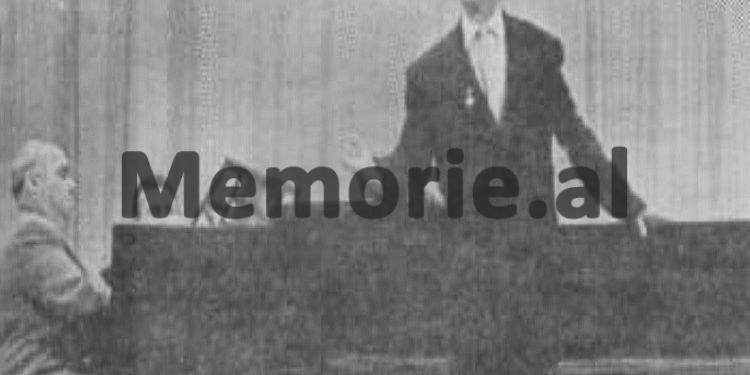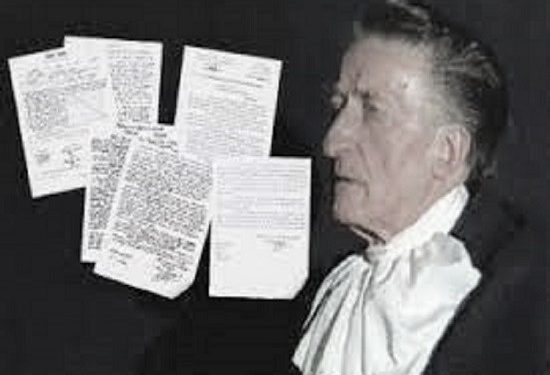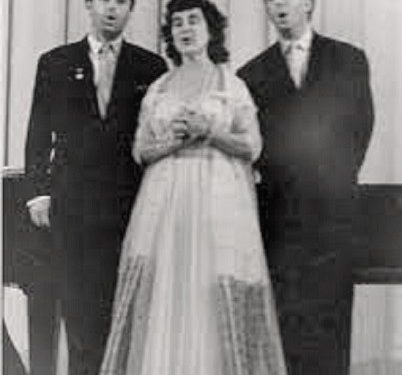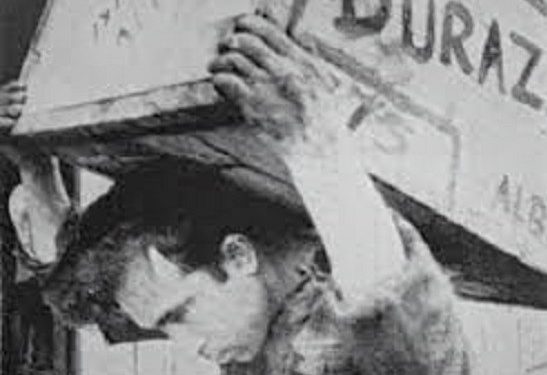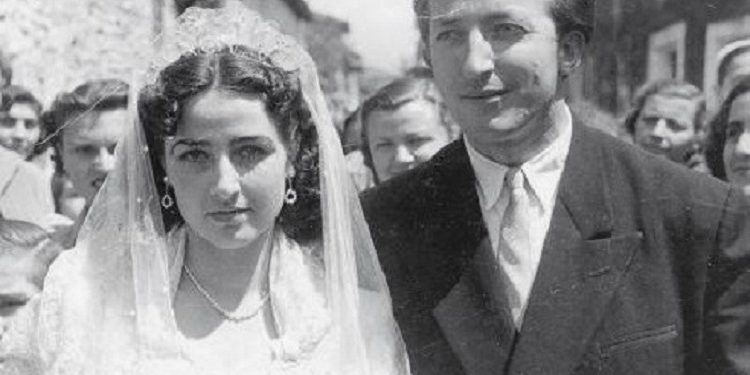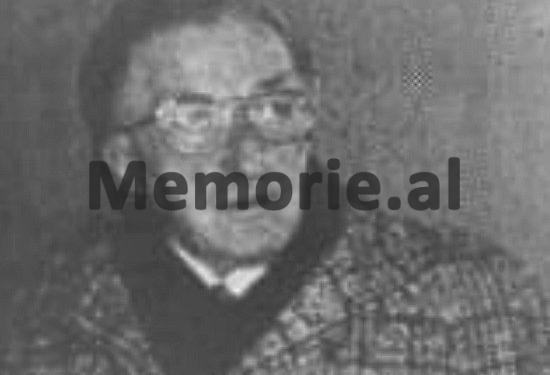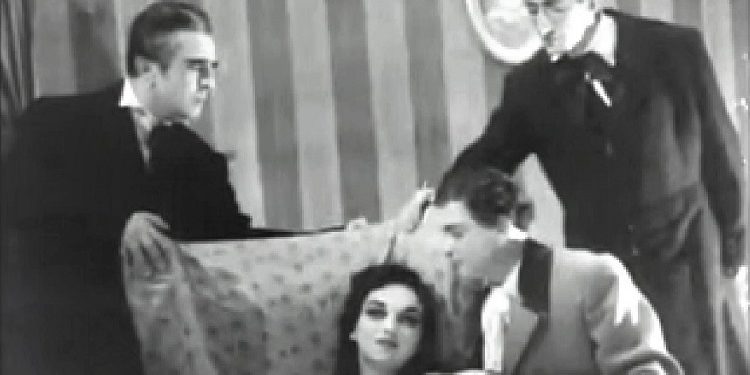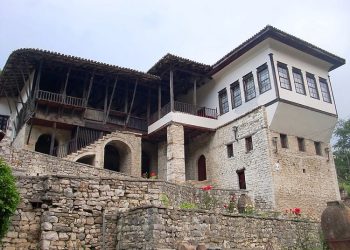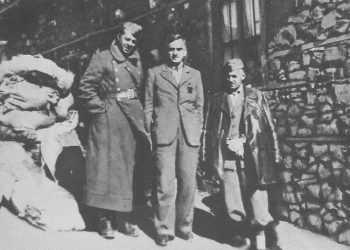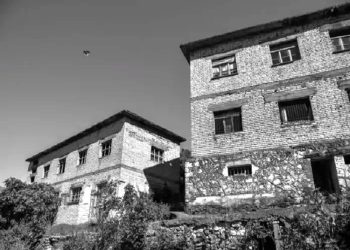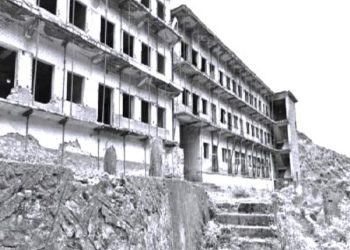Dashnor Kaloçi
Memorie.al publishes the unknown story of the great artist Lluk Kaçaaj, originally from the village of Aliaj in Kastrati in the Malësia e Madhe, who from an early age was sent to attend classes at the Jesuit College in the city of Shkodra and beyond back to the Classical High School “Ylliricum”, where from the beginning he stood out for his melodic voice with a special timbre and Dom Ndre Zadreja, the famous author of the melodramas “Ruba e Kuqe”, “Rrethimi i Shkodrës” and “Rozafa”, the poet and the famous musician who discovered many talents, together with Dom Mikel Koliqi, also discovered Lluka’s talent, which would later be kept close by Filip Mazrreku and composer Father Martin Gjoka, encouraging him not to leave never his passion, the song. Lluka’s arrival in Tirana near the Army Choir, where the masters of music, Gaqo Avrazi, Kristo Kono and Kostandin Trako, immediately discovered the talent with his characteristic voice, which in 1947, would participate in the First World Youth Festival , in Prague, Czechoslovakia, reaping success with his distinctive voice. Lluk Kaçaj’s brilliant career on the European stage, where he had various offers to go to the West, as well as studies at the Tchaikovsky Conservatory in Moscow, where he took fourth place out of 170 candidates, as well as many awards he won in various tours around the world, increased his fame, so much so that in Moscow, he was called the “New Albanian Shaliapin”! Lluka’s sentence in 1973, after the blow that dictator Enver Hoxha inflicted on the so-called “hostile group in art and culture” where Lluka was demonstratively barred by the State Security in the presence of his students at the High Institute of Arts, from where he would later be sentenced to 10 years in prison, for agitation and propaganda, as an “enemy of the people”!
Someone had compared his pure voice to a gigantic deep sea, when he sang low, and to a sea troubled by storms and sparks, when he sang high, to shock with the extraordinary power of the artistic spirit, of the many colors who owned his vocals. But it was not only his highly imposing voice and technique that shocked the opera scenes of Moscow, Leningrad, Budapest, Prague, Bucharest, etc., countries of the Communist East in Eastern Europe, for which one of the most famous professors of the Soviet Union, he said to Boris Hristov, the star of world opera music: “You are both great, but Luke has a much more sensitive spirit, he sings with more spirit…”!
The talent that came out of the Jesuit College in the city of Shkodra!
Shkodra was the city where Lluka first stepped in the early 1930s to enroll in the Jesuit College, under the care of his acquaintance Fratel Gjoni, a friend of poor Shkodra families. Born in the village of Aliaj in Kastrati, in 1925, Lluk Kaçaj would leave at an early age, tucked under the clothes of a Jesuit jackal. In that religious college, as well as the classical Lyceum “Ylliricum”, where Lluka later studied, which were the most complete schools of that time in Albania, taught a pedagogical body, who had graduated from various universities in the West, not only in Theology, but also in many other branches.
Luke would quickly stand out, for his melodious voice, which stood out among the other peers, filling the chorus of jackets. Dom Ndre Zadreja, the famous author of the melodramas “Ruba e Kuqe”, “Rrethimi i Shkodrës” and “Rozafa”, the famous poet and musician who discovered many talents, together with Dom Mikel Koliqi, also discovered Lluka’s talent, which they would hold close to and encourage, never to deviate from his passion, the song. Shkodra, one of the cities of art and culture in Albania in those years, where the first theatrical societies were established – musical, religious and secular, such as “Rozafa” and “Bogdani”, became a sound base where many talents were cultivated that stood out in several genres of art for years, reaching peaks, such as: Çesk Zadeja, Pjetër Gaci, Tish Daija, Loro Kovaçi, Pjetër Gjoka and many others, where among them an honorable place is occupied by Lluk Kaçaj.
Influenced by the composers Father Martin Gjoka and Father Filip Mazrreku, who would have a great role in its formation, Lluka would be very indifferent to the adventurous life offered by the young age and the passions it brought. His only passion was song and poetry, where he would carry with him “Lahuta e Malësia”, “Mrizin e Zanave” and “Juden Macabe”, etc., which he would never share and then, when because of them his freedom would be taken away and his song would be forbidden, though they could never uproot him from his soul. Lluka, as rarely anyone, was one of them, who not only knew many of Fishta’s works by heart, but also recited them with a brilliant interpretation, which amazed everyone, especially “Lahuta…”! In addition to singing, influenced by his two professors, Father Martin Gjoka and Father Filip Mazrreku, during the lessons at the Jesus College, Luke would also acquire some musical instruments, such as the organ and the violin.
It was this thing that helped him a lot, in later years when he ascended the operatic scenes, with perfection in acting that was intonated along with the characteristic voice, like a perfect duet. Many of the friends and peers, who had the opportunity to hear Lluka in those years, interpreting with passion and soul “Albanian Language” and “Emigrant” of Fishta, say: “When you heard Lluka recite those verses, you were forced to forget the sense of time of the space that surrounds it”! Lluka completed his studies at the Classical High School “Ylliricum” in 1944 and at the suggestion of Father Mati Prendushi, (because the communist regime had started the war against the Catholic Clergy), he would leave Shkodra to come to Tirana.
In the Army Choir in Tirana in the years
At the end of 1944, a few days after the end of the war, the Army Choir was formed in Tirana, where most of the singers who debuted there, came from the partisan ranks. In this choir, which was also the first nucleus of the Army Ensemble and also of the State Ensemble of Folk Songs and Dances, along with many artistic leaders, among who were Gaqo Avrazi, Kristo Kono and Kostandin Trako, who discovered the talent with the characteristic voice of Lluka, coming from the city of Shkodra. In this Ensemble, for several years, under the care of these great masters, for whom Luke had an extraordinary adoration, he taught, raised and disciplined his voice, to lead it to a brilliant perfection, which amazed everyone. his lecturers and anyone who had the opportunity to hear him at various rehearsals and concerts.
Early in the summer of 1947, Luke was announced to be attending the First World Youth Festival, to be held in the then Czechoslovak capital, Prague. Based on this, for about three months in a row, Luke practiced his voice, rehearsing every day, until late at night. According to the pre-arranged program, the Albanian Youth delegation participated in the First World Youth Festival in Prague, where Lluka shone with all the power of his soul, astonishing thousands and thousands of spectators who had come from many Eastern European countries. After the competitive concert, as a result of the many requests of many spectators who filled the halls and squares, the group from Albania was forced to give many other performances, where Lluka always received constant applause, the first interests of foreign specialists began, making him various offers.
Thus, in those days in the Czechoslovak capital, where a large number of countries from all over the world participated in the competition, some music specialists got in touch with Lluka and suggested to him: “Come with us, leave Albania, you are a great talent, that you will be extinguished in vain. In two hours we leave for London, you will be covered with money… ”! But even though the British offer was very kind, the talented young man was not seduced, not only because he knew the “fate” that would await his family in Shkodra, but also for a very simple thing: The one who is small in Jesus College, he was molded by his professors with love for the homeland, and thus he thought only of Albania and could never do such a thing! So he could not leave the homeland, as did his disciples: Fishta, Mjeda, Father Anton Harapi, Dom Mikel Koliqi, and others, from the elite of the Catholic Clergy, who never left Albania under any circumstances that i’u solli jeta.
At the Tchaikovsky Conservatory in Moscow, the fourth of 170 competitors!
In 1953, Luke took part in the Second World Youth Festival held in Bucharest, where with the interpretation of Philip’s aria from Verdi’s opera “Don Carlos”, his voice and fame spread throughout Europe. As a result, Luke was honored by winning the II International Prize of that Festival,
Seeing his rare singing skills and the great success he reaped in many concerts, appreciated by many foreign specialists from the Communist East countries who came to Albania, in 1955, Lluk Kaçaj was awarded a right to study (special scholarship) from the Albanian state, to pursue higher studies at the Music Conservatory “Tchaikovsky” in Moscow, where in the competition between 170 candidates from around the world, the Albanian Luk Kaçaj, would take fourth place. As a result, he began his studies at that famous Conservatory (where he was also given a payment of 1,200 rubles per month), where at that time hundreds of thousands of students were studying, from many different countries of the world, from where the stars of music of operatic scenes, as was Boris Hristov, Luke’s course companion. In this Conservatory, Luke, would stand out very quickly and would be in the spotlight, of operatic music specialists, as one of the most complete basses: So he quickly climbed the famous stage of “Balshoi Theater” in the roles of Ivan Zezamin (Ivani), Doctor (Traviata), King Rene (Jolanda Çajkovsky), Sparafucile (Rigoleto) etc.
In addition to these roles in the famous Moscow Opera, Luke gave several recital concerts, some of which were accompanied on piano by the famous composer Dankijevije. After many great successes he achieved during his years of study at that Conservatory, came the time of graduation, where with a repertoire of interpretation, in four foreign languages, (Luke knew Latin, Italian, French and Russian), he amazed the members of the commission. Thus, the chairman of the Graduation Commission, Cesjevic, would express himself with superlatives for the Albanian student, saying: “To have the honor of the walls of the Moscow Conservatory, to prepare and produce great singers, such as the Albanian Lluk Kaçaj, for classical music, music of the room and the operatic one”. Less than ten days had passed since Luke’s graduation, when he participated in the big competition announced by the “Balshoi Theater”, for the selection of singers from all over the Soviet Union. With permission from the Albanian embassy in Moscow and personally from the chief conductor of “Balshoi”, Melik Rashelev, Luka was allowed to participate in that big competition, where out of 170 participants, won only four of them, one of whom was Luka.
In 1951, at the Fourth World Youth Festival held in Bucharest with the participation of singers from 54 countries, Luke, with the interpretation of the aria of Philip II from the opera “Don Carlos”, by Giuseppe Verdi, with the voice his, was recognized throughout Europe. In this World Youth Competition, Lluka won second place by being awarded the “Silver Medal”. On September 28, 1958, Lluka performed the role of Don Bazilios on the stage of “Balshoi Theater” in Giacomo Rossini’s opera The Barber of Seville, with tremendous success. In this regard, the editor of the magazine of this theater, among other things in the article written about this event, emphasized “The scene of ‘Balshoi’ has seen this role in Shaliapin and Zesievic, but the interpretation of Lluka, there is no change from their”. In many other tours, which Lluka participated in Eastern European countries, he was tempted with various offers to buy it.
So on October 14, 1955, in Berlin (after the partition of Germany), he was proposed after the given concert, in four foreign languages, offering a sum of 150,000 marks, to start his career in the West. Also in 1960, during a tour in Poland, at the Bristol Hotel, where Lluka was accommodated, he approached a Yugoslav diplomat (of the Yugoslav embassy in Poland), who proposed that he leave Albania for her. developed his activity, in some high world artistic forums, of that time. Before the tour of Poland, in 1959, in Kiev, Ukraine, where the final concert of the ‘Decade of Friendship Ukraine – Albania’ was given, Lluk Kaçaj with his performance receives an extraordinary appreciation from more than 2500 spectators present, who applauded with applause?
Regarding the successes of the famous opera singer Lluk Kaçaj, in the concerts given in the Soviet Union, the newspaper “Zeri i Popullit” wrote, where in a long article of it, on December 10, 1958, by the journalist Çot Papuli , which referred to the Soviet press, which called Luke “Albanian Shaliapin”. From 1947, when Luke first participated in the World Youth Festival in Prague (when he was not more than 23 years old), until 1961, when he last debuted on the European stage, he has performed hundreds of arias, romances, folk songs and ballads, epic-legendary, which can be said without a doubt, have shocked the biggest scenes of the Soviet Union, Poland, Czechoslovakia, Germany, Bulgaria, Hungary, etc. In many countries, where he performed, he was compared by many prestigious magazines, such as: “The new Shalipain” of Albania!
At the age of 36, he is awarded the title: “Merited Artist”
After many successful concerts in various European countries, in 1961, Lluka was awarded the high title “Merited Artist”, at a time when he was not more than 36 years old. In the motivation of the certificate signed by the chairman of the Presidium of the People’s Assembly of that time, Haxhi Lleshi, it was said: People of Albania”.
In addition to many roles in operatic scenes that he played in various European countries before the ’60s, Lluka continued to perform at the Albanian Opera, in her first performance, “Mrika” by Prenk Jakova, in the role of Gjin , (in 1962) and in “Spring”, by Tish Daia. Some time ago, he had played the aria in the Albanian-Soviet film “Skanderbeg”, which at that time had a great success not only in Albania, but also in the Soviet Union of that time, appearing in most of the republics his Likewise. During all these years in Tirana, he performed in foreign operas, which were staged by the Opera House, as “Pearl Fishermen” by George Bieze, in the role of high priest in “Eugjen Onjegin”, “Bohema” by Puccini (general) in “Clown” (the role of Colin) by Leoncavallo etc.
From the critics of the time, Luke was not only appreciated as a great singer, but also as a capable actor. In this regard, the Albanian critics, among others, in the press of the time, emphasized: stage expressions, complemented by mimicry and plasticity, all justified from a musical point of view”. Given the gifts that Lluk Kaçaj had in the field of acting, in the late ’60s, the famous director, Piro Milkani, would entrust him with a role (father of the action girl), in the feature film Why it falls this drum”of Kinostudio“ Shqipëria e Re ”(according to the novel Dasma by Ismail Kadare), where he was praised by the critics of the time, for his high mastery of acting.
After the 11th Song Festival on Radio-Television, accusations against Lluk Kaçaj!
From the mid-60s, when the winds of the Chinese ‘Great Cultural-Proletarian Revolution’ began to blow in Albania, where as a result many of the musical pieces of the foreign repertoire, Lluk Kaçaj, were banned. Opera and Ballet Theater, to serve only as a lecturer of Canto, at the Higher Institute of Arts in Tirana. He saw with deep regret that instead of classical pieces, Chinese pieces were put in the Opera House, such as: “Women’s Red Detachment”, “The Great Steering Wheel”, etc., where artists were forced to dress with overalls, or in military uniforms and holding a pickaxe and a rifle! Lluka himself was against these badly copied models, which stripped the most beautiful operatic art in Albania and from time to time he began to speak openly. This was a great courage for the time, or more precisely a heresy, as the attack on the so-called “hostile group in art and culture” led by Todi Lubonja and Fadil Paçrami (which culminated with the 11th Festival– had just begun) of the National Song on Radio-Television), and thus the policy of the communist regime in power, could not ask for anyone!
Sentenced to 10 years in prison, on the charge: “Fishta worshiper”!
Thus, in the framework of this campaign of terror and savage repression against people of art and culture and not only, in 1973, after a series of meetings that were held in almost all cultural and artistic institutions of Tirana, (such as the People’s Theater, Theater of Opera and Ballet, Folk Songs and Dances Ensemble, Albanian Radio-Television, Kinostudio “Shqipëria e Re”, Higher Institute of Arts, State Variety, League of Writers and Artists of Albania, etc.), where besides Todi Lubonja and Fadil Paçrami, who had been placed at the center of the beatings and accusations, “shock wave”, stretched and initially caught some of the main characters of art and culture, names known as: the director of the Opera Theater, Koço Vasili, the artistic director of his, Milto Vako, the famous director and pedagogue, Kujtim Spahivogli, the playwright Minush Jero, the director Mihallaq Luarasi, the journalist and playwright, Ibrahim Uruçi, etc., focusing on Lluk Kaçaj.
In this context, the State Security organs, on April 23, 1973, organized the public arrest of Lluk Kaçaj, putting handcuffs, demonstratively in front of his students of the High Institute of Arts, to terrorize them. He was accused of being: “anti-party, reactionary, anti-government”, and all sorts of other epithets, from the most serious that began to be articulated at that time, after Enver Hoxha’s speech, originally held on January 6, in the meeting with the Presidium apparatus of the People’s Assembly and then in the extended meeting of the communists of the apparatus of the Central Committee of the ALP. The accusations made against Lluk Kaçaj, in the meetings of cultural and artistic institutions, were “copied” by the State Security and investigation bodies, accusing him of: “He carried out agitation and propaganda, against the popular power”, “he kept hostile attitudes”, “he propagated in front of his colleagues and students the vile enemy, Padër Gjergj Fishta ”, etc.
Lluka did not deny to the investigator, who had propagated Gjergj Fishta’s work to his students. He also recited them to his investigator, to convince him of the great patriotic and patriotic values of the great poet, or “National Poet”, as he called Fishta. The trial, which took place in August of that year, sentenced Luke to 10 years in prison (and confiscation of movable and immovable property) on the charge: “Enemy of the people, who has done agitation and propaganda, against the popular power”. He served his sentence in several forced labor camps and prisons, mainly in Ballsh, due to his aggravated health condition, where he was isolated for years, leaving only his family (wife, Ana), and even in miserable conditions, which was forced to sell not only their piano and library books, for food, but also to sell blood. Lluka was released from prison in 1978 and after serving his sentence, as if to humiliate him, the communist regime sent him to work as a porter at the Fruit and Vegetable Warehouse, at the New Bazaar in Tirana. He died on September 7, 2001 in the civil hospital of Shkodra, the city where he lived the last years of his life.
After serving his sentence, the great bass singer and artist, with a characteristic voice that had made the opera scenes of Europe tremble, was sent to work in a company, doing various manual works, to support himself and his family. Likewise, after his release from prison, after almost all his friends had left, Lluka found time and often went to the small town of Laç, where his relatives, the large Kaçaj family (Rrok Kaçaj), had lived for years. , Anton Kaçaj, Ndue Kaçaj, Lec Kaçaj, Gjek Kaçaj, Zef Kaçaj, Seferin Kaçaj, etc.) Who, although with many biographical problems, loved, kept and respected Lluka, as he once did in the peak of its splendor.
Luke rests near the Church of St. Ndout, in Laç i Kurbinit
Lluka lived another decade after the fall of the communist regime and on September 7, 2001, he would close his eyes forever in a room of Shkodra Hospital, parting from this life, to which he gave everything and took almost nothing! Having no relatives in the city of Tirana, his funeral was done by the relatives he had in the city of Laç and also by Salvator Kaçaj, (former well-known football player of the National team and former mayor of Shengjin), who escorted him with all honors, to the last residence, to the Catholic cemetery located near the Church of St. Ndout, in Kurbin. Shortly after his death in 2003, the former President of the Republic, Mr. Alfred Moisiu awarded the title “Grand Master of Labor”, while in 2009; President Bamir Topi awarded Lluk Kaçaj, the high medal: “Honor of the Nation”. /Memorie.al






